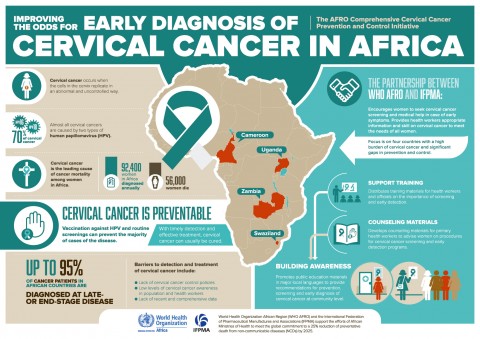The AFRO Comprehensive Cervical Cancer Prevention and Control Initiative
The partnership between WHO AFRO and IFPMA encourages women to seek cervical cancer screening and medical help in case of early symptoms, and provides health workers appropriate information and skill on cervical cancer to meet the needs of all women.
Partnership objectives
- Building awareness: promoting public education materials in major local languages to provide recommendations for prevention, screening and early diagnosis of cervical cancer at community level.
- Support training: distributing training materials for health workers and officials on the importance of screening and early detection.
- Counselling materials: developing counselling materials for primary health workers to advise women on procedures for cervical cancer screening and early detection programs.



Cancer is an emerging public health problem throughout the African Region; and breast and cervical cancers are among the most common cancers affecting women. In sub-Saharan Africa, the incidence of cervical cancer and breast cancer is no higher than in other parts of the world, but the risk of death among women with either disease is much higher than in high-income countries – eight times higher in the case of cervical cancer. This is because too many African women are diagnosed too late which hampers effective treatment and care. Effective screening programs could drastically improve survival rates for women affected.
Supported by some funding and in-kind contributions from IFPMA, the partnership will implement cancer prevention and control activities in four countries with a high burden of cervical cancer: Cameroon, Uganda, Swaziland and Zambia, in collaboration with the respective ministries of health. In addition, the partnership will work with healthcare providers to improve their knowledge about screening strategies.
The partnership “AFRO Comprehensive Cervical Cancer Prevention and Control Initiative” works across the African Region to improve awareness; help empower women and healthcare professionals to improve prevention, screening and treatment rates of breast and cervical cancers.
92,400 women are
diagnosed with cervical cancer annually in Africa
Up to 95% of cancer patients
in African countries are diagnosed at late-or end-stage disease
22.5 per 100,000 women
die from cervical cancer In sub-Saharan Africa







